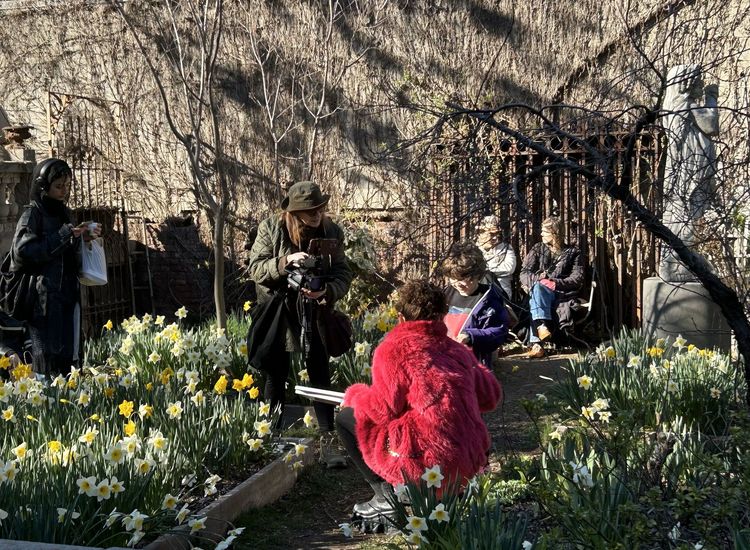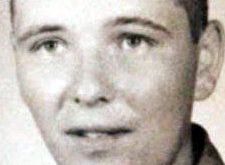[caption id="attachment_70681" align="aligncenter" width="600" caption="Honor Molloy."]
“I got flung out of Ireland,” said Honor Molloy.
It was a characteristically physical description by a writer whose fictional alter ego is a child acrobat.
But you’ll have to read her “Smarty Girl: Dublin Savage” to find out why the 8-year-old Molloy relocated to Allentown, Pa., with her five siblings and her American-born mother.
Her first novel is all at once a documentary investigation, a fictionalized rendering of a childhood and a faithful recreation of 1960s Dublin.
Writer Peter Quinn said that actor, playwright and now novelist Molloy is an “amazing talent.”
He said: “If Honor wasn't so warm, engaging, funny and wonderful to be around, she'd be entirely intimidating.”
Quinn described “Smarty Girl” as a “laugh-out-loud, rollicking good read.”
“The whole thing is highly theatrical, because we were a theatrical family,” Molloy said.
Her grandfather, Dick Molloy, had been a music hall comedian. “He’s supposed to have been the most amazing physical clown,” she said. Her father, John Molloy, was an innovative actor who became famous in the 1960s as a star of Irish television’s first soap opera, “Tolka Row.” His characters were twins Oliver and Dominic Feeney. Honor Molloy made occasional appearances on the show as Oliver’s daughter Noeleen.
Molloy borrows the names for “Smarty Girl,” changing only Feeney to O’Feeney, while Ely Place, the Georgian street in central Dublin where they lived, becomes Tolka Row (though the television series was set on the north side).
The novelist’s mother, Yvonne Voigt, a native of Reading, Pa. had no Irish background; she did, however, have an interest in the work of J.M. Synge and traveled to Dublin in 1954 to study for her doctorate at Trinity College
The gentle and refined scholar was different in most respects to the extroverted actor Molloy, who’d had a difficult life to that point. He left his Irish-speaking Christian Brothers school as a teenager unable to read or write and was only taught later by a friend. And he spent six years during his adolescence and early adulthood in a tuberculosis ward.
Though they appeared a mismatch, Honor Molloy’s parents shared a passion for theater. One of their first projects together was a mid-1950s Trinity Players’ tour of English colleges, including Oxford University.
Together the couple made their home a center for artistic and bohemian Dublin, and their third child, Honor, remembered that the writers and performers who passed through made life very exciting. “And, then, it wasn’t like that anymore,” she said, referring to the move to Allentown.
“My mother misses Ireland every day,” Molloy said. “Dublin was not her home. But she found something and built something she adored. It’s been a weird purgatory living these years here.”
Honor Molloy made her first journey back to Dublin as a 20-year-old in 1981. Her father was in a relationship with another American and had three more children, but he was no longer the center of things in the arts scene. Instead, his daughter felt that she’d stepped into episode of “Tolka Row.”
Molloy’s career had reached another peak in the mid-1970s when he starred in the successful production of “Talbot’s Box” by Thomas Kilroy (but he failed to show for opening night when it transferred to London). A 1976 documentary, “John Molloy’s Dublin,” showcased the talents of a man who brought working-class characters to the stage and spoke for a “poetry of the pavement.” (RTE’s website is showing it throughout 2012 as part of the station’s 50th anniversary celebrations. The program notes state that the actor studied under Marcel Marceau in Paris. Honor Molloy said that was one of her father’s inventions.)
Molloy confided to his daughter when she made the first trip back in 1981 that he was going to accept an offer of work in Berkeley, Calif., and that when it was finished he would stay. He left his partner and children behind, and never visited Dublin again. His daughter last saw him in a psychiatric jail in 1997. He died in Oakland in 1999 at age 70.
“There was so much beauty and humor and fun,” she recalled. “He had such a great imagination.
“You could fix anything, you could solve any problem, and then there were days he just made all the problems,” she added.
The book is an attempt to find out what “broke” her father. The story she set out to write was “about acting. It was about alcoholism. It was the bloodline. It was tuberculosis. It was about theater as a disease, as a kind of curse.”
There was abuse, too, at home and at school. And there was an incident involving a fire when he was a young child, to which he referred in a letter to her.
The novelist had help from an oral historian in Berkeley who had met her father and was fascinated with the eccentric character that he had become.
Molloy said: “What was real and what was theatre? What was life and what was a lie is a big question in the book, too. There’s a very thin line – there’s just one letter between ‘life’ and ‘lie.’”
She soon realized that she needed to fictionalize the book and introduce her father’s and other perspectives.
“I couldn’t stand having a child’s voice for 270 pages,” she said.
Molloy reproduces two letters that her mother wrote to family members in America in 1969.
Yvonne Voigt Molloy reads them herself in the audio book of “Smarty Girl.” The author’s fellow Dubliners Kevin Holohan, Aedin Moloney and Susan McKeown also read and McKeown sings.
It was a long road from the original idea to the publication of the book (GemmaMedia) and its audio version (Simon & Schuster). Like most in the business, Molloy has written and experimented with a theatrical piece for a time before deciding that it could only be developed so far and that it wouldn’t make it to a full stage production. “I’d say: ‘It goes in the vault’,” she said. “But the book couldn’t go in the vault. I couldn’t put it the drawer.
“I just spent too much time on it,” Molloy said. “It was too finished – and too ready and too needing a readership to put in a drawer and say ‘Oh, I’ll go do something else.’”
Upcoming “Smarty Girl” readings
Honor Molloy’s “Smarty Girl: Dublin Savage” will feature with other writers’ works as part of the 12th season of Little Theatre @ Dixon Place on this coming Monday, at 7:30 pm at Dixon Place, 161A Chrystie Street (between Delancey and Rivington). Tickets are $12.00 in advance online at ovationtix, $15.00 at the door; reservations are not accepted. For more information, go to www.dixonplace.org
Molloy will also read on Wednesday, April 18, SUNY, New Paltz, with Kevin Holohan (“The Brothers’ Lot”), “An Evening of Contemporary Irish Literature: Dublin in Light and Shadow” at 5 p.m., Honors Center; on Thursday, April 23, 7 p.m., Barnes & Noble, Upper East Side (at Lexington Avenue and 86th Street); on Thursday, April 26, 7 p.m., at Watchung Bookshop, Montclair, N.J.; and on Tuesday, May 15, Irish Arts Center, New York City.








